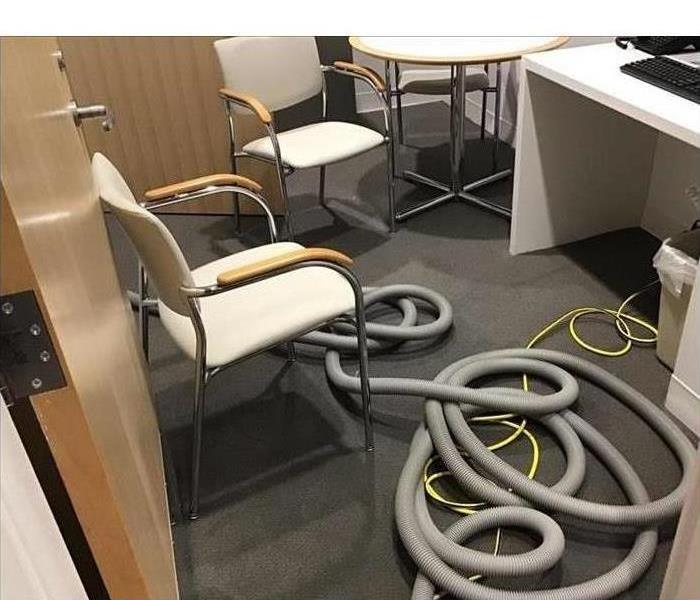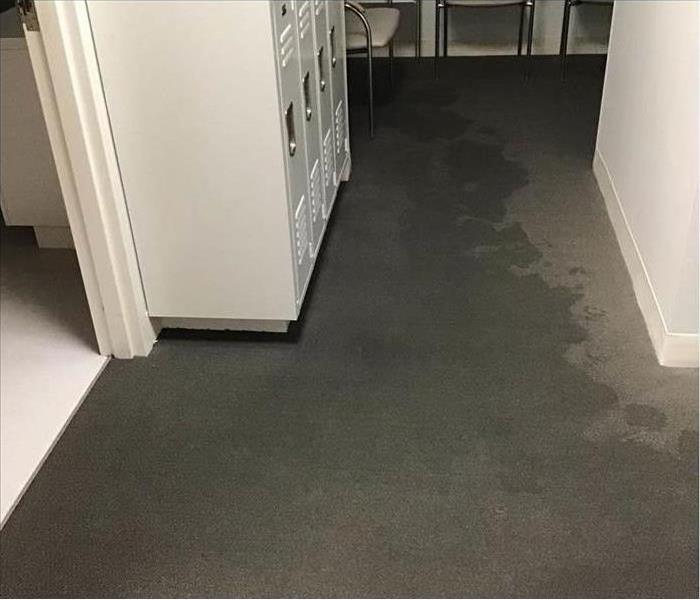Archived Commercial Blog Posts
How To Deal With Water Damage in Your Place of Business
8/25/2022 (Permalink)
 Extracting standing water from commercial building
Extracting standing water from commercial building
Anyone who has had to deal with pipe burst cleanup knows water damage can be a serious business. Have you recently had a broken pipe in your office in Weston, FL? The severity of the water damage and how much of the building was affected can determine whether you should handle the job yourself or if you should call a professional restoration company to help.
Where To Begin
First, make sure the place is evacuated. Don’t have customers or employees in the building until after the affected areas have been cleaned and inspected. Take safety precautions before you start the pipe burst cleanup process:
- Turn off the power to the building.
- Unplug all electrical cords.
- Remove appliances and electronics from the area.
How To Clean Up
Once you have taken the necessary precautions, begin to clean the mess. Start by removing any soaked items such as area rugs and carpeting. Then mop up the water or soak it up with old towels and rags. Try to air the building out by turning on fans and opening all windows and doors to get a cross breeze. Use a dehumidifier to remove excess moisture from the air.
After you clean up the excess water, check for damage. Look at the floors and walls to see if water has soaked through. If you see signs of water damage, it is best to call a sewer cleanup company to come help. Mold can begin to grow if any moisture is not properly cleaned. If mold has already begun to grow, it is even more vital to call professionals.
Pipe burst cleanup can be a real hassle. Fortunately, there are services available to help. The sooner you begin the process of drying things up, the better. Don’t wait for mold to develop before you have the area cleaned. Be proactive in these situations to avoid preventable issues.
The Effects of Smoke Damage on Electronics
5/17/2022 (Permalink)
In this day and age, electronics are essential to keep your Cooper City, FL, business running. If an electrical fire occurs and damages that vital equipment, it means unwanted downtime and potential loss of vital data. After contacting your insurance provider to file a claim, the next step is determining what may or may not be salvageable.
The Effects of Smoke Damage
If the device has come into contact with flames, you can plan on it not being saved. Most devices have plastic of some form that will likely have melted. When it comes to items affected by smoke, determining if they can be saved is much more difficult. Below are three effects smoke may have on your devices:
- Soot is carried in the smoke. Since soot is acidic, it means increases the chances of corrosion and another electrical fire.
- A film may be left behind by the soot that insulates components and creates the potential for overheating.
- The magnetic charge in smoke may make devices short circuit, creating a new fire hazard.
Even if the device was not near the flames, it is best to unplug devices and get them inspected. It is especially important to turn them off if there is a smoky odor, the device seems hotter than usual or electric sounds are being heard.
Smoke Cleaning Methods
Not surprisingly, the sneaky nature of smoke makes it difficult to determine if electronics have been affected. A professional fire damage restoration will have the expertise to not only provide information on what may be usable but also have the tools and methods to properly clean some devices. From computer cleanup to monitors, a certified electronics professional will conduct a thorough inspection, take apart the device and restore it if possible.
If your business has experienced an electrical fire, the last thing you want is a damaged device to start another one. While not all electronics may be saved, getting them inspected and professionally cleaned is important.
Does Commercial Insurance Cover Mold Damage?
4/11/2022 (Permalink)
 When a pipe bursts it can cause major water damage.
When a pipe bursts it can cause major water damage.
Is Mold Damage Covered by Commercial Insurance?
Water damage from storms, floods and leaks can cause significant damage to your property. To make matters worse, the moisture from these events also provides a fertile breeding ground for mold. If your property has suffered water damage, you should review your commercial insurance policy to see what coverage is provided for mold.
Why Mold Is a Problem
Many people may see mold as primarily an aesthetic issue and focus on getting rid of the stains and smell. However, mold damage is a serious problem for several reasons:
- Can grow on almost any surface
- Often grows under floors, behind walls, in ducts, behind ceiling tiles and other places where it isn't visible
- Feeds on the material it grows on, which may damage or destroy it
What Commercial Property Insurance Covers
Most commercial insurance policies include a fungus exclusion that eliminates coverage for damage caused by the growth, proliferation, presence or spread of bacteria, fungus and wet or dry rot. Mold, mildew, spores, toxins, by-products and scents produced by fungi are included in this exclusion.
The standard ISO commercial policy contains three exceptions to the fungus exclusion. The mold that occurs because of fire or lightning is covered. A specified cause of loss that occurs because of fungus is covered. Finally, mold that occurs because of a specified cause of loss other than fire or lightning is covered by mold insurance, called Limited Fungus Coverage.
How Limited Fungus Coverage Works
Limited Fungus Coverage applies when a specified cause of loss results in mold. For example, if you have a broken pipe and the water damage from that pipe causes mold, then the cost of removing the mold or repairing any damage caused by the mold is covered up to the $15,000 limit.
Though commercial insurance policies broadly exclude coverage for mold, if the mold occurs due to a covered cause of loss, limited coverage applies in most policies. An insurance professional in Weston, FL, can help you review the specific coverages in your policy.
Three Reasons Why Your Business Needs Flood Insurance
2/1/2022 (Permalink)
Why Purchase Flood Insurance?
When you are taking out insurance for your Weston, FL business, you might wonder if you really need to get separate flood insurance. While it might seem like an unnecessary extra expense, it can be incredibly helpful in an emergency. If you need more convincing, here are a few reasons why you should purchase this type of insurance.
1. Floods Are Not Covered Under Other Types of Insurance
Perhaps the most obvious reason why it is a good idea to get this added insurance is that other kinds of commercial insurance do not cover damage caused by floods. Your standard commercial property insurance covers many kinds of damage, but if you are hit by a flood, you will not be covered unless you have a separate policy specifically for that purpose.
2. Water Damage Can Be Costly
If your business is flooded, you might end up with quite a bit of water damage. This can include damage to the building itself as well as the property inside of it. Floors and walls might need to be replaced by a professional water damage repair service which can take a lot of time and money. If you have expensive equipment or computers that need to be replaced, it will be even more costly. In this case, having flood insurance can save you from a huge financial loss.
3. It Might Be Required
In some cases, you might be required to get flood insurance. This will likely be the case if you have a mortgage on the property and you live in an area with a high risk of floods. The lender will want a guarantee that the property is protected in an emergency.
You cannot predict when bad weather will happen, and you should protect your business from all possible scenarios. Because other types of commercial insurance do not include floods, it is a good idea to purchase a separate flood policy.





 24/7 Emergency Service
24/7 Emergency Service
